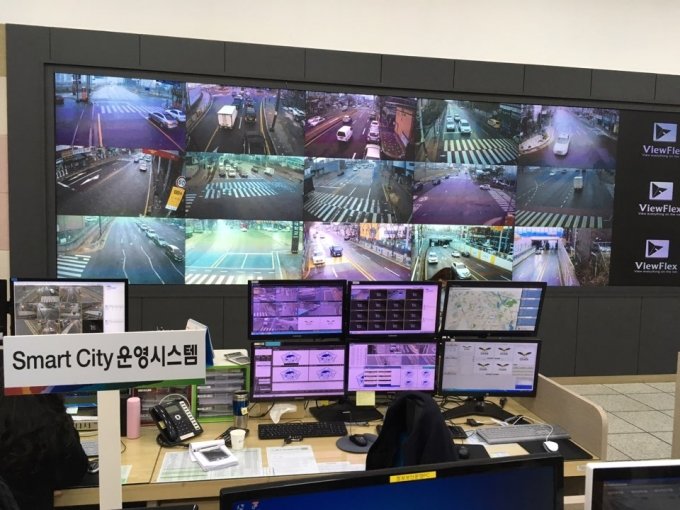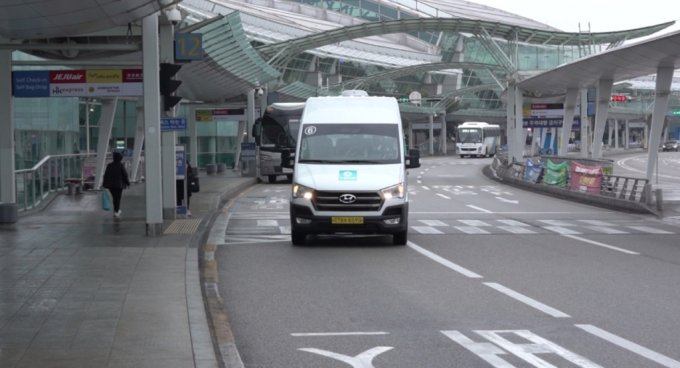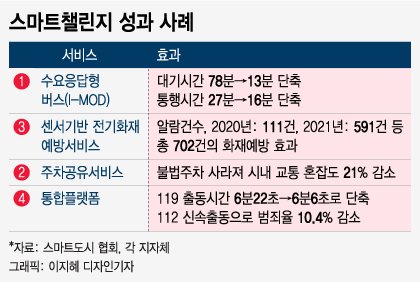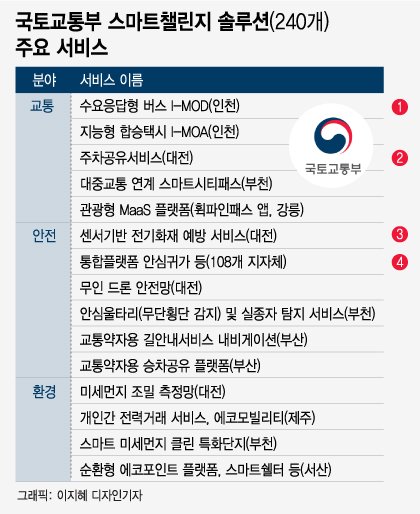[Smart City 4 years, so different] ① 240 smart solutions that changed the daily life of citizens
# After the final exam, Incheon Yeongjong High School 1st year group A visited Incheon University's Songdo Campus. It takes over 3 hour and 1 minutes to get to Songdo by changing three buses. Group A found the shortest course in 30 minutes using the multi-modal service (I-trip) app that Incheon City integrated five modes of transportation to guide the fastest route. I used the shared electric kickboard I-ZET to the bus stop, took the seat bus No. 5 bound for Songdo, and then arrived at the campus by using the demand-response bus (I-MOD) that gets off at a desired location like a taxi. Saved about an hour.

△ Control screen inside the Smart City Integrated Operation Center in Osan-si, Gyeonggi-do / Photo = Smart City Association
The daily life of citizens is changing in major cities such as Incheon, Daejeon, and Bucheon with the 'Smart City Challenge Project' launched by the Ministry of Land, Infrastructure, and Transport in 2020 (the main project). The Smart City Challenge is a project to solve urban problems such as traffic, environment, and safety using information and communication technology (ICT), and 64 smart infrastructures and services have been spread in a total of 240 cities. In the 'smart city', citizens' travel time was shortened by one hour and illegal parking was eliminated, resulting in a 1% improvement in traffic congestion. The time to dispatch 21/119 to fight 'village' has increased, and the crime rate has decreased by 112%. Traditional market merchants no longer have to worry about fire.
Bus running like a taxi, waiting time 78 minutes → 13 minutes, travel time 27 minutes → 17 minutes

△ I-MOD bus driving in Incheon, which participated in the Smart City Challenge project / Photo = Smart City Association
Incheon City, which was selected as the first city of MOLIT's Smart City Challenge, successfully established demand-responsive transportation. Unlike general buses, demand-response buses (I-MODs) do not have fixed routes and operating hours. When you call it through the app, it changes the route in real time according to an artificial intelligence algorithm and takes you to the desired place. Passengers with similar directions may ride together. The fare is 1 won for 7 km, between a taxi and a bus, and 1800 cars are operated in Songdo, Yeongjong, and Namdong.
How has the daily life of citizens changed? If the departure point and the destination were the same, the waiting time for a regular bus took as long as 78 minutes, but it was shortened to 13 minutes by I-MOD by 1 hour (based on the preliminary project). Travel time has been reduced from 27 minutes to 16 minutes. The introduction of I-MOD in Yeongjong, where public transportation is inconvenient, was effective. The Hyundai Motor Consortium, a private operator, entered the project with enthusiasm and secured business continuity.
In addition, Incheon City's intelligent shared taxi I-MOA is a case of 'win-win' between new smart city technologies and existing businesses. About 200 private taxis have signed up, allowing shared rides within 8km of the city center during commuting hours. Shared passengers receive a 30% discount.
Illegal parking disappears with parking sharing service, and traffic congestion is 21% ↓.. Fire risk in traditional markets has been prevented 700 times


Smart city technology is responsible for city 'safety' beyond transportation convenience. The sensor-based fire prevention service in Daejeon, which MOLIT selected as the first, lowered the risk of fire in the traditional market. Electricity detection sensors developed by FS, a small and medium-sized company, are attached to 1 stores in traditional markets to monitor fire risk 560 hours a day. When an overcurrent flows, an alarm sounds on the smartphone of the owner and manager, and FSS staff is dispatched if necessary.
A merchant in the Daejeon Central Market said, “The compressor of the refrigerator broke down and an overcurrent flowed, and I was aware of the danger through the sensor alarm sound.” “It almost caused a fire.” In the past two years, it has been effective in preventing fires about 2 times. Due to overcurrent and short circuit, 700 alarms in 2020 and 111 alarms in 2021 sounded. There were 591 staff dispatches.
The parking sharing service in Daejeon has solved the parking problem. A Daejeon city official said, "With the 'Smart On' app that has registered 128 parking lots in the city, you can easily find empty parking spaces near the target point." Illegal parking in the city has disappeared as the use of parking lots has changed to be more efficient. Traffic congestion improved by 21%.
119 response time 6 minutes 22 seconds → 6 minutes 6 seconds reduction
The 'integrated platform' built by MOLIT and introduced by 108 local governments reduced the time required to dispatch 119 and the police, leading to the effect of preventing fire damage and lowering the crime rate. The integrated platform is linked with 10 public services such as police, firefighting, and disasters, and local government closed circuit (CC)TV information is shared based on location. When the 112 report is received, CCTV data of the accident area is transmitted, allowing the police to know exactly the situation at the scene, which is difficult to grasp through a report phone call. When 119 is reported, the road and parking conditions near the fire area are identified with CCTV to find the route of the fire truck. Thanks to this, the emergency response time for fire, rescue, and ambulance, etc. was shortened from an average of 119 minutes and 6 seconds to 22 minutes and 6 seconds, and the crime rate decreased by 6%.
Kim Ik-hoe, head of the Smart Space Research Center at the Korea Research Institute for Human Settlements, said, “More than 4 smart city solutions that change the daily life of citizens have been developed over the past four years.
[Joint Planning: Ministry of Land, Infrastructure, and Transport Money Today]



